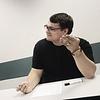You need to sign in or sign up before continuing.
Take a photo of a barcode or cover
challenging
emotional
reflective
sad
medium-paced
Plot or Character Driven:
A mix
Strong character development:
Complicated
Loveable characters:
N/A
Diverse cast of characters:
No
Flaws of characters a main focus:
Complicated
I'm not even going to pretend to understand what this poem is about. I've argued, for one of my literature essays, that the poem signifies a conflict between tradition and modernity. However, it could be read any of a thousand ways. That is the beauty of this poem. You read it, you take what you can from it, and you interpret it in a way which makes the most sense to you. There is no right or wrong; just the hope that you will gain something from it.
I don't claim to understand it all--or even a quarter of it--but the language is stunning. This small collection of Eliot's work is something I'll return to again. Particularly the title poem. I was as lost as I was fascinated. I love "The Journey of the Magi."
It is a deep poetry book. The waste land is a review of all literature. It has simbolic references from a lot of authors and books. I recommend to read it.
1. Not a book. 2. I first read this poem in 2018 3. I wanted to reread it after having watched Eraserhead.
In Eraserhead, Lynch creates a desolate industrial landscape which synthesizes the dehumanized American industrial past and our worst fears of a dystopian future. As society advances in technology, it loses touch with humanity. This has been one of our most prominent fears since, at least, the industrial revolution.
Written during the 1920s in America amidst a boom of success for writers and other artists alike, T.S. Eliot resurfaces this age old fear in The Wasteland. With increased urbanization our fears of dehumanization were made manifest in the daily commute. A repetitive ritual which wears the worker dry. Eliot pulls from the classical past, the Christian tradition, and eastern religions to saturate the lifeless rituals with spirituality. His grand effort in this poem is to inform the present with the orthodoxy of the past. The present appears to be, and perhaps is, a desolate wasteland. But this account of the humdrum urban ritual is littered with historical orthodoxy.
Lynch shows us a dystopian scene which has lost touch with rich classical grounding. The wasteland in Eraserhead is mechanical, industrial, and bleak. While the scenery stems from the same fear, the spirituality in Eraserhead does not appeal to tradition but instead is internalized. Escape is found in the dream state.
In Eraserhead, Lynch creates a desolate industrial landscape which synthesizes the dehumanized American industrial past and our worst fears of a dystopian future. As society advances in technology, it loses touch with humanity. This has been one of our most prominent fears since, at least, the industrial revolution.
Written during the 1920s in America amidst a boom of success for writers and other artists alike, T.S. Eliot resurfaces this age old fear in The Wasteland. With increased urbanization our fears of dehumanization were made manifest in the daily commute. A repetitive ritual which wears the worker dry. Eliot pulls from the classical past, the Christian tradition, and eastern religions to saturate the lifeless rituals with spirituality. His grand effort in this poem is to inform the present with the orthodoxy of the past. The present appears to be, and perhaps is, a desolate wasteland. But this account of the humdrum urban ritual is littered with historical orthodoxy.
Lynch shows us a dystopian scene which has lost touch with rich classical grounding. The wasteland in Eraserhead is mechanical, industrial, and bleak. While the scenery stems from the same fear, the spirituality in Eraserhead does not appeal to tradition but instead is internalized. Escape is found in the dream state.
I love T. S. Elliott. And I love that poem. Sometimes I think his works require a certain amount of thinking and mind processing though.
I hadn’t revisited T.S Eliot in years and remembered how much Eliot’s poetry shaped my worldview as a teenager. It was an absolute delight to get lost and awe-inspired in his words. He blends nature, introspection, and observation together so well with strings of eloquent words. I try to read a book of poetry for every set of novels I complete and I’m really glad I chose this one- some texts are classics for a reason.
This is an amazing work; I am deeply intrigued by Eliot's mastery over poetry and the weaving of words together in his rhythm. "The Wasteland" while a bit hard to get through packs a punch.
Favorites: The Love Song of J. Alfred Prufrock, Gerontion, The Waste-Land, Ash-Wednesday, Marina, Two Choruses from "The Rock".
Favorites: The Love Song of J. Alfred Prufrock, Gerontion, The Waste-Land, Ash-Wednesday, Marina, Two Choruses from "The Rock".





